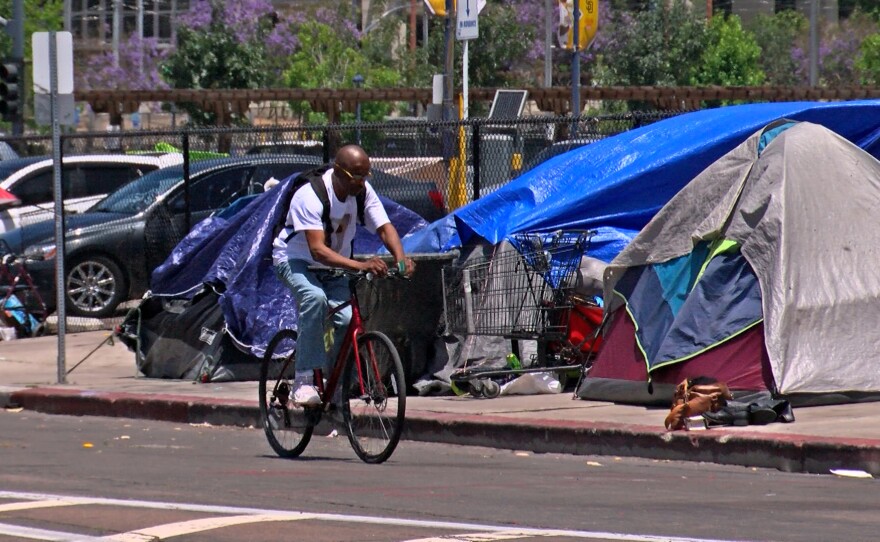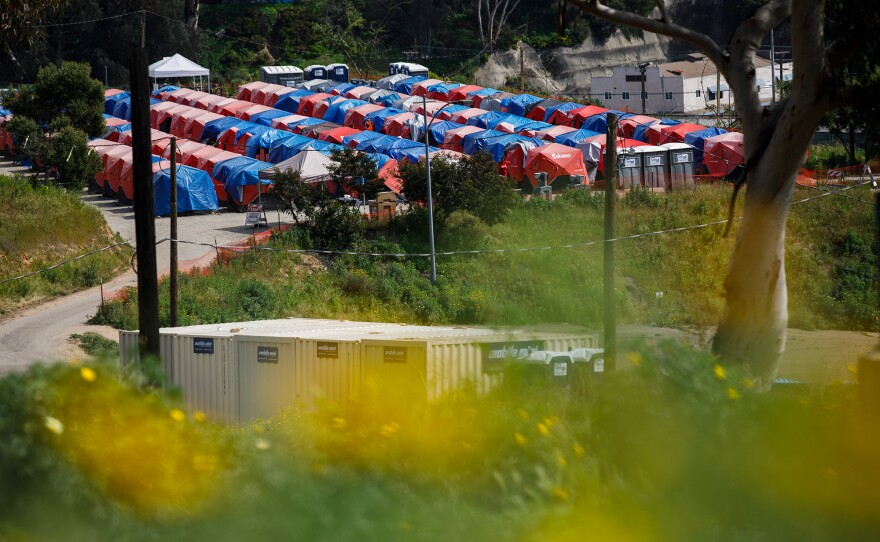For the second year in a row, Democrats today voted down a bill that sought to ban homeless encampments near schools, transit stops and other areas throughout California.
Despite the fact that cities up and down the state are grappling with a proliferation of homeless camps, legislators said they oppose penalizing down-and-out residents who sleep on public property.
“Just because individuals that are unhoused make people uncomfortable does not mean that it should be criminalized. And this bill does that,” said Sen. Aisha Wahab, a Democrat from Fremont and chairperson of the Senate Public Safety Committee. “The penalties will just be added to their already difficult situation of paying for things.”
Senate Bill 1011 stumbled in its first committee hearing, stalling in the Public Safety Committee on a 1-3 vote. The measure by Senate GOP leader Brian Jones and Democratic Sen. Catherine Blakespear, both of the San Diego area, would have made camping within 500 feet of a school, open space or major transit stop a misdemeanor or infraction. It also would have banned camping on public sidewalks if beds were available in local homeless shelters.
“I’m disappointed in the closed-minded opposition from the majority party members of the Senate Public Safety Committee to new approaches and their knee-jerk support of just throwing more money at the problem with no real plan,” Jones said in a statement. “Today’s continued rejection of real solutions during this health and safety crisis is immoral and irresponsible.”
After today’s defeat, Jones will continue speaking with committee members to see if there is any way to negotiate a path forward for his bill, spokesperson Nina Krishel said in an email.
Sen. Nancy Skinner, a Democrat from Oakland, said while she appreciates that Californians don’t want to see encampments, she couldn’t support the bill.
“It’s kind of like trying to make a problem invisible versus addressing the core of the problem,” said Skinner, who joined Wahab and Sen. Scott Wiener, a Democrat from San Francisco, in voting “no.”
More than three dozen people voiced their opposition to the bill during today’s hearing, speaking on behalf of organizations such as the Ella Baker Center for Human Rights and the American Civil Liberties Union California Action.
The bill’s supporters, who numbered far fewer, included the mayor of Vista and a representative from the city of Carlsbad.
The lone “yes” vote came from the committee’s only Republican, Sen. Kelly Seyarto of Murrieta.
“We had a slew of people that came forward to tell us about what we shouldn’t be doing,” he said. “But what the hell should we be doing? Because right now we’re not doing anything.”
Sen. Steven Bradford, a Democrat from Inglewood, abstained.
Wahab granted reconsideration, which means the committee could hear the bill again later this session. But last year, a nearly identical bill met the same fate. SB 31, also introduced by Jones, died in the Senate Public Safety Committee with one “yes” vote, one “no” vote and three abstentions. It also received reconsideration, but was never revived.
This year’s version of the encampment ban had more going for it. Jones found a Democratic co-author and narrowed the bill’s scope. Instead of banning people from camping within 1,000 feet of schools and other locations, the new bill would have banned people from camping within 500 feet.
Jones also was leaning heavily on a new camping ban in San Diego, upon which he said he modeled his bill. The San Diego ordinance, which took effect at the end of July 2023, bans camps near schools, shelters and transit hubs, in parks, and — if shelter beds are available — on public sidewalks. Jones called the ordinance a “success,” a sentiment echoed by San Diego Mayor Todd Gloria.
But a CalMatters investigation paints a more complicated picture. While encampments have drastically decreased in some areas, such as downtown and around certain schools, they are still just as prevalent — in some cases much more so — along the city’s freeways and the banks of its river. Opponents of the ordinance say it displaces people instead of housing them.
And Jones’ bill failed to copy a key piece of San Diego’s approach. When the city started enforcing its encampment ban, it also opened two massive “safe sleeping” sites where about 500 people camp on vacant lots in tents purchased by the city.
Jones’ bill would not have forced cities to set up accommodations for people displaced from encampments, because, he said, there’s no state funding for that.
-
A new bill would make it illegal for homeless residents to camp in certain places, such as near schools, throughout California. Its authors say such a ban has had great success in San Diego. But a closer look at that city paints a more nuanced picture.
-
The U.S. Supreme Court agreed to hear a case that has implications for how much power California officials have over homeless camps.










